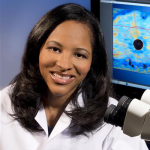The Department of Ophthalmology and Visual Sciences invites you to the George Kambara, MD, Vision Science Symposium being held on Friday, April 11, 2025. This annual symposium showcases vision research being conducted on the UW–Madison campus and by other leading institutions. The 2025 keynote speaker will be Kia Washington, MD, from the University of Colorado-Anschutz Medical Campus. Each session will begin with a presentation from featured speakers, Tsutomu Kume, PhD, Northwestern University School of Medicine; Arthur J. Sit, MD, MS, Mayo Clinic; and Frans Vinberg, PhD, University of Utah School of Medicine.
Please register to attend:
George Kambara, MD, Vision Sciences Symposium
8 AM – 4 PM · Friday, April 11, 2025
Health Sciences Learning Center, Lecture Hall 1335
750 Highland Avenue
— Complimentary Breakfast at 8 AM —
Keynote Speaker
 Kia Washington, MD, is the Director of Research in the Division of Plastic Surgery and Vice Chair of Diversity and Inclusion for the Department of Surgery at the University of Colorado – Anschutz Medical Campus. She completed her undergraduate studies at Stanford University, and obtained her MD from Duke University School of Medicine. From 2003-2012, Dr. Washington participated in her post-graduate training at UPMC: General Surgery internship, Plastic and Reconstructive Surgery residency, and Hand and Microsurgery fellowship. Prior to her appointment at Colorado, she served as Assistant Professor of Plastic Surgery, Associate Director of Hand Transplantation, Department of Plastic Surgery, University of Pittsburgh Medical Center. She also held secondary appointments in the Departments of Orthopaedic Surgery and Ophthalmology and served as the Section Chief of Plastic Surgery, Veterans Affairs Pittsburgh Healthcare System. She is board certified by the American Board of Plastic Surgery (ABPS), as well as a Subspecialty Certification in Surgery of the Hand (SOTH).
Kia Washington, MD, is the Director of Research in the Division of Plastic Surgery and Vice Chair of Diversity and Inclusion for the Department of Surgery at the University of Colorado – Anschutz Medical Campus. She completed her undergraduate studies at Stanford University, and obtained her MD from Duke University School of Medicine. From 2003-2012, Dr. Washington participated in her post-graduate training at UPMC: General Surgery internship, Plastic and Reconstructive Surgery residency, and Hand and Microsurgery fellowship. Prior to her appointment at Colorado, she served as Assistant Professor of Plastic Surgery, Associate Director of Hand Transplantation, Department of Plastic Surgery, University of Pittsburgh Medical Center. She also held secondary appointments in the Departments of Orthopaedic Surgery and Ophthalmology and served as the Section Chief of Plastic Surgery, Veterans Affairs Pittsburgh Healthcare System. She is board certified by the American Board of Plastic Surgery (ABPS), as well as a Subspecialty Certification in Surgery of the Hand (SOTH).
In September of 2024, she received major funding from ARPA-H to continue her research exploring whole-eye transplantation as a viable treatment for vision loss, in particular in the traumatic setting. This research has been mentioned in almost 700 media outlets. She previously received major funding from the Department of Defense through the Joint Warfighter Medical Research Program in October 2016 for her research exploring whole-eye transplantation. She has received many awards for her research, including the 2016 ARVO/Alcon Early Career Clinician-Scientist Research Award and the 2015 Military Health System Research Symposium’s Research award sponsored by the Assistant Secretary of Defense for Health Affairs. Her work has been featured in Science magazine, STAT online magazine, Pittsburgh Business Times, Pittsburgh Tribune, and Pitt Med Magazine.
Featured Speakers
 Tsutomu Kume, PhD, is a Professor of Medicine (Cardiology), Ophthalmology, and Pharmacology at Northwestern University Feinberg School of Medicine. Dr. Kume’s lab is recognized for studies uncovering the gene regulatory mechanisms by which FOXC1/FOXC2 transcription factors control the formation of the anterior segment. Studies in his group have recently extended toward disorders of the trabecular meshwork, Schlemm’s canal, and retinal blood vessels. Using mouse models, his lab has established a research team at Northwestern to investigate the pathophysiology of ocular diseases, including glaucoma, ischemic retinopathy, and ocular surface disease.
Tsutomu Kume, PhD, is a Professor of Medicine (Cardiology), Ophthalmology, and Pharmacology at Northwestern University Feinberg School of Medicine. Dr. Kume’s lab is recognized for studies uncovering the gene regulatory mechanisms by which FOXC1/FOXC2 transcription factors control the formation of the anterior segment. Studies in his group have recently extended toward disorders of the trabecular meshwork, Schlemm’s canal, and retinal blood vessels. Using mouse models, his lab has established a research team at Northwestern to investigate the pathophysiology of ocular diseases, including glaucoma, ischemic retinopathy, and ocular surface disease.
 Arthur J. Sit, MD, MS, is a Professor of Ophthalmology, Research Chair, and Glaucoma Fellowship Director at the Mayo Clinic. He earned his Mechanical Engineering degree from the University of Toronto and an MS from MIT, then completed his medical training and glaucoma fellowship at UC San Diego. His research focuses on the eye’s biomechanics and intraocular pressure changes that affect glaucoma. His work is funded by the NIH, NASA, and other organizations. Dr. Sit was the 2024 American Glaucoma Society Lecturer, is a Fellow of the Association for Research in Vision and Ophthalmology, and has received several clinician-scientist awards. He currently serves as Treasurer and an Executive Committee member for the World Glaucoma Association.
Arthur J. Sit, MD, MS, is a Professor of Ophthalmology, Research Chair, and Glaucoma Fellowship Director at the Mayo Clinic. He earned his Mechanical Engineering degree from the University of Toronto and an MS from MIT, then completed his medical training and glaucoma fellowship at UC San Diego. His research focuses on the eye’s biomechanics and intraocular pressure changes that affect glaucoma. His work is funded by the NIH, NASA, and other organizations. Dr. Sit was the 2024 American Glaucoma Society Lecturer, is a Fellow of the Association for Research in Vision and Ophthalmology, and has received several clinician-scientist awards. He currently serves as Treasurer and an Executive Committee member for the World Glaucoma Association.
 Frans Vinberg, PhD, is an Associate Professor in the Department of Ophthalmology and Visual Sciences at the University of Utah, with an adjunct position in the Department of Biomedical Engineering. He earned his Master’s and PhD in Engineering Physics and Biomedical Engineering from Helsinki University of Technology and Aalto University. Since 2009, his research has focused on photoreceptor physiology, including phototransduction and light adaptation. In his lab, started in 2017, he developed methods to revive postmortem human eyes for research. Dr. Vinberg has received several career development awards and the University of Utah PIVOT Center Innovation Award, and his recent work addresses retinal ischemia and testing new therapies.
Frans Vinberg, PhD, is an Associate Professor in the Department of Ophthalmology and Visual Sciences at the University of Utah, with an adjunct position in the Department of Biomedical Engineering. He earned his Master’s and PhD in Engineering Physics and Biomedical Engineering from Helsinki University of Technology and Aalto University. Since 2009, his research has focused on photoreceptor physiology, including phototransduction and light adaptation. In his lab, started in 2017, he developed methods to revive postmortem human eyes for research. Dr. Vinberg has received several career development awards and the University of Utah PIVOT Center Innovation Award, and his recent work addresses retinal ischemia and testing new therapies.
Kambara Program Schedule
| 8:00 AM Complimentary Breakfast |
| 8:20 – 8:30 AM · Chair’s Welcome: Terri Young, MD, MBA |
| SESSION I | MODERATOR: Donna Neumann, PhD |
| 8:30 – 9:00 AM · Featured Speaker: Arthur Sit, MD, MS |
| Repetitive Strain and Glaucoma |
| 9:00 – 9:20 AM · Elleny Guttierez, MD |
| Association of Calcium Channel Blocker Use with Increased Risk of Primary Open-Angle Glaucoma and Thinner Peripapillary Retinal Nerve Fiber Layer Thickness in the Second Carotenoids in Age-Related Eye Disease Study 2 (CAREDS2) |
| 9:20 – 9:40 AM · Gillian McLellan, BVMS, PhD, DACVO, FARVO |
| Distal Outflow Pathway Abnormalities in Feline Glaucoma |
| 9:40 – 10:00 AM · Donna Peters, PhD |
| Age-Related Dysregulation of Integrin Activity and Glaucoma |
| 10:00 – 10:20 AM · Break |
| SESSION II | MODERATOR: Mrinalini Hoon, PhD, MSc |
| 10:20 – 10:50 AM · Featured Speaker: Tsutomu Kume, PhD |
| New Roles of FOXC1 Transcription Factor in Endothelial Cell-Pericyte Interactions in Retinal Vascularization and Disease |
| 10:50 – 11:10 AM · David Gamm, MD, PhD |
| From Discovery to Trial: CLARICO, a Phase 1/2a Interventional Study of an iPSC-Derived Photoreceptor Precursor Cell Therapy for Primary Photoreceptor Disease |
| 11:10 – 11:30 AM · Roomasa Channa, MD |
| Photoreceptor Thickness Changes in Patients with Diabetes |
| 11:30 – 11:50 AM · Celia Bisbach, PhD |
| Characterizing the USH1/MYO7A Interactome in Human Retinal Organoids |
| 11:50 – 12:10 PM · Nancy Barrett, MS |
| AI-Based Prescreening for Diabetic Retinopathy Trials |
| 12:10 – 1:00 PM · Lunch Break |
| KEYNOTE INTRODUCTION AND PLAQUE PRESENTATION: Robert Nickells, PhD, F. A. Davis Chair, Ophthalmology and Visual Sciences |
| 1:00 – 2:00 PM · Keynote Speaker: Kia M. Washington, MD, FACS |
| Whole Eye Transplantation Therapy for Vision Restoration: A Comprehensive Approach |
| 2:00 – 2:15 PM · Break |
| SESSION III | MODERATOR: Ismail Zaitoun, PhD |
| 2:15 – 2:45 PM · Featured Speaker: Frans Vinberg, PhD |
| Ischemic Injury in the Mouse and Human Retina |
| 2:45 – 3:05 PM · Bikash Pattnaik, PhD, RRF / Daniel M. Albert Chair |
| A Gene Agnostic Therapy to Address IRD Conundrum |
| 3:05 – 3:25 PM · Andrew Miller, PhD |
| Retinal Circuit Specializations for Encoding Primate Central Vision |
| 3:25 – 3:45 PM · Nader Sheibani, PhD, RFF / Alice R. McPherson Chair |
| RIPK3 and Ocular Vascular Development and Neovascularization |
| 3:45 – 4:05 PM · Natascha Merten, PhD, MS |
| Sensory and Motor Function Among Best Predictors of Cognitive Changes |
| 4:05 – 4:10 PM · Closing Remarks |
The Kambara Symposium is supported by the George Kambara Education Fund and the McPherson Eye Research Institute.
